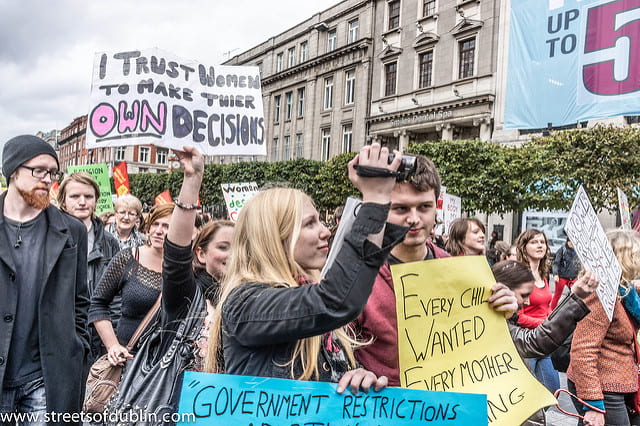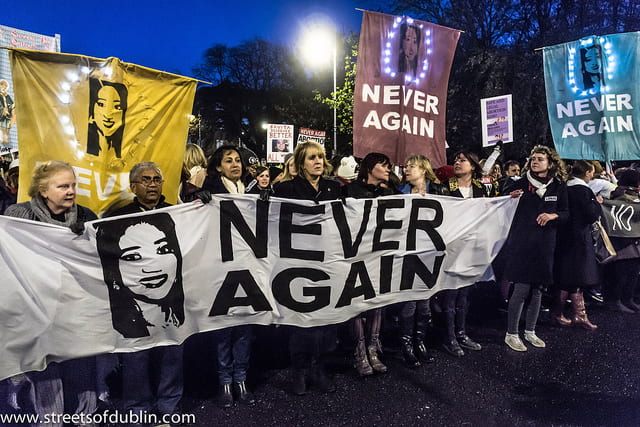Tomorrow, May 25, Ireland will vote on a referendum of their Eighth Amendment: the abortion amendment. The referendum posits safe and regulated healthcare, as well as the removal of the stigma placed on both the women who seek abortions and the doctors who perform them. **This is a repost from the fall of 2016.

Abortion. It is a heavily debated topic. From the beginning, its very existence is consistently brought up in philosophy papers and classes as a moral question. The negative connotation associated with abortion can make many people cringe when they simply hear the word. In the United States, it is an issue that conservatives and progressives rally around, but for different reasons. Classic conservative ideology revolves around public virtue, self-reliance, freedom, and cultural solidarity. One might argue that if classic conservatism highly values freedom, then the ideology would advocate for the freedom to choose whether to have an abortion or not. However, modern conservatism has implemented a little twist in such ideological freedom. Modern conservatism has emphasized the nuclear family model and to a degree, Christianity. Ronald Reagan once said, “We cannot diminish the value of one category of life — the unborn — without diminishing the value of all human life.” We see a shift in ideological values. The argument could be made that modern conservatives still value freedom as much as the classic conservative ideology does. The new paradigm frames the issue of abortion as not about the freedom to choose, but rather the act of having an abortion is committing the act of murder. This places a negative stigma with regards to abortion due to the fact that murder is socially condemned and lawfully illegal. Progressive ideology tends to promote social justice, egalitarianism, and inclusiveness. It tends to frame the issue of abortion as the mother’s right to choose whether to continue the pregnancy or not because a fetus is a part of her body, and not a human being considering that it has not been birthed. The belief that abortion is immoral stems from the emphasis on family values as well as religious interpretations that consider abortion an act of murder. In relation to all of these things, is it fair for a national government to ban abortion? I’m not talking about defunding Planned Parenthood or limiting the amount of abortion clinics in a country. Is it fair for a national government to blatantly make abortion illegal and a punishable crime? The United Nations Human Rights Committee doesn’t think so in relation to Ireland’s ban on abortion.
Ireland’s deep-rooted Catholic tradition appears in many of its laws, one of those being the country’s eighth constitutional amendment. The amendment of 1983 established a nationwide ban on abortion. The amendment reads: “The State acknowledges the right to life of the unborn and, with due regard to the equal right to life of the mother, guarantees in its laws to respect, and, as far as practicable, by its laws to defend and vindicate that right.” It can be debated that this amendment implies that the unborn fetus has more rights than the person carrying the child. So, when it comes to the United Nation’s definition of Human Rights, who do those rights extend to? Can an unborn fetus have human rights? Once again, the United Nations says “no.” The broad definition of human rights given to us by the UN states “human rights are universal legal guarantees protecting individuals and groups against actions which interfere with fundamental freedoms and human dignity.” The word “individual” has been deemed insufficient as to identifying if that entity must have already been born in order to take ownership over human rights. Due to the need for clarification on what makes someone an “individual,” there have been a few other conventions and commissions within the UN that has attempted to resolve such confusion on this controversial issue. For example, the Convention on the Rights of the Child does not identify one’s right to life until birth. However, the CRC does say, “the child, by reason of his physical and mental immaturity, needs special safeguards and care, including appropriate legal protection, before as well as after birth.” Rhonda Copelon, Christina Zampas, Elizabeth Brusie, and Jacqueline deVore argue that “this reflects, at most, recognition of a state’s duty to promote, through nutrition, health and support directed to the pregnant woman, a child’s capacity to survive and thrive after birth…” They also argue that access to safe abortions to pregnant adolescent women is a human right given to women under the right to adequate health. That is, providing safe abortions will decrease the maternal mortality rate due to the decrease in unsafe abortions.
Ireland’s law on abortion insinuates that if the fetus has any sort of problems in the womb, that the mother will still be subject to carry it to full term. In the 2011 case of Amanda Mellet, 21 weeks into pregnancy, the fetus was diagnosed with Edwards’ Syndrome and congenital heart defects that led doctors to believe that it would either die in the womb, or perhaps only live a few hours after being born. Amanda and her husband had requested an exception to the ban on abortion because of the emotional toll that carrying the fetus to full term would bring upon the both of them, but especially for Amanda who would literally have to carry the fetus whose life was already predetermined to end in just a matter of time. The Mellet couple was denied such an exception due to the fact that the mother’s life was not at risk. However, they traveled to Liverpool where they would be provided a safe abortion by a doctor without being criminalized.

Ireland’s abortion ban carries a heavy weight on the issue of the mother’s health. Although Irish Law claims that the only exception for a woman to get an abortion is if her life is at risk, doctors claim that the language used for exceptions is very vague and medical professionals would rather not perform one at all rather than risk going to prison for following their own interpretation of the exception to the law. In 2012, Savita Halappanavar was in extreme physical and emotional discomfort when she knew she was miscarrying, but her request for an abortion was denied because doctors said that the fetus still had a heartbeat. She arrived at the hospital on Saturday. On Wednesday, it was discovered that the heartbeat of the fetus had stopped; Savita died due to septicemia one week after arriving at the hospital. It is believed that if the doctors would have performed an abortion, Savita would have lived.
The United Nations Human Rights Committee ruled that Ireland’s abortion ban is a violation of women’s human rights because the law “subjects a woman to cruel, inhuman, and degrading treatment.” Such a ruling should not come as a shock to the international community considering UN legislation has insisted that the rights of the unborn are non-existent. Ireland’s law arguably gives more rights to the unborn than it gives to the human. Ireland is creating a social stigma that labels women who get an abortion as murderers and criminals.
Under Irish law, women who have had an abortion within the country are subject to up to fourteen years in prison. So, what’s the solution? Ireland insists that women who want access to a safe abortion should get one out of the country. According to Amnesty UK, a minimum of ten women and girls travel out of Ireland and into England every day in order to get access to a safe and legal abortion. However, not everyone is fortunate enough to travel out of the country to acquire proper medical treatment due to the expense of making such a trip. Also, those who are refugees or asylum seekers are not legally able to leave Ireland at all. Therefore, although Ireland may think that they are being reasonable by allowing women to receive abortions elsewhere, they are still impeding on the human rights of women. Even for the ones who can afford to travel, it is still an expense and a nuisance to have to leave one’s own country for such a procedure; especially for those who are experiencing extreme pain and suffering due to a complicated pregnancy.
The United Nations Human Rights Committee looked at the case of Amanda Mellet (the Center for Reproductive Rights filed a complaint for her) and found that her human rights were being violated under articles 7, 17, and 26 of the International Covenant on Civil and Political Rights. I commend Ireland on accepting marriage equality, but it is now time to recognize the rights of women. Women have been denied certain rights for so long and although we have gained many, the good fight is not over. The same government who says that it is okay for same sex couples to marry should be the same government that allows women the right to terminate a pregnancy.

